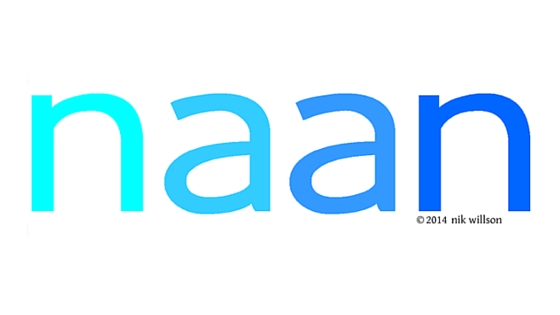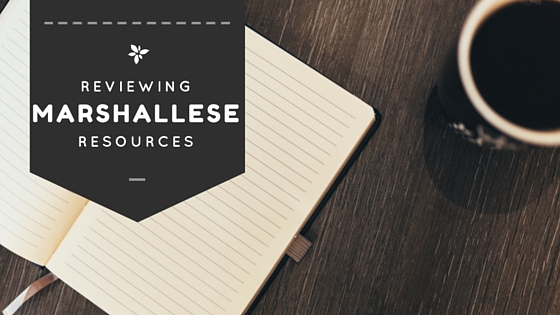-

Lesson 41: Directionals
– To say ‘to me,’ ‘to you,’ etc. in Marshallese, you can sometimes just say ‘ñan ña,’ ‘ñan kwe,’ etc. like in English. However, you can also use the following words: Directionals tok to me/us (towards where I am or where we are) wōj or waj to you (towards where you are) ḷọk to him/her/it/them…
-

Lesson 39: Which fish, what kind of fish, you and who else?
There are even more ways to make questions in Marshallese. – To say ‘which ___’ or ‘what kind of ____’, use the following words after the noun: ta which? rot or rōt or tor what kind of? For example: Āne ta? = island/which = Which island? Ek rōt? = fish/what kind = What kind…
-

Lesson 38: More about questions
In Lesson 19 you learned some common questions words (‘who,’ ‘what,’ etc.) and learned that they can be put in many places in the sentence, not just at the beginning. There are some exceptions to this. For the words for ‘how,’ ‘how much,’ ‘how long,’ and a certain word for ‘why,’ you must put them…
-

Lesson 37: After, before
You can use ‘my,’ ‘your,’ etc. in yet another way in Marshallese. To say ‘after you go,’ or ‘before you go,’ you say instead ‘after your go,’ ‘before your go’.
-

Lesson 36: Comparatives in Marshallese
In the last lesson you learned how to make sentences like ‘I fish often’ by saying ‘it is often my fish.’ You can also do the same sort of thing with adjectives, to say things like ‘It is very good,’ ‘it is pretty good,’ etc. Here are some words you can use this way:…
-

Lesson 35: Adverbs
Practical Marshallese. In Marshallese, instead of saying ‘I walk fast’ you would say ‘it is fast my walk.’
-

Lesson 34: Perfect Past Questions
Learn how to ask questions about events that may have been completed.
-

Lesson 33: Negative Perfect Past
To express negative past perfect statements, you can use the word “jañin”.
-

Lesson 32: Perfect Past
In Marshallese the following are expressed in the same way: I am finished eating, I have eaten, I already ate, I have already eaten.
-

Lesson 31: Not yet and never
Marshallese has a word ‘jañin’ (or ‘jāñin’) that means ‘not yet.’ It goes before the verb or adjective.
-

Lesson 30: Do you have?
To make questions with ‘have’ (like ‘do you have a pencil?’ or ‘does she have any sisters?’) just add ‘ke’ after ‘ewōr’ or ‘elōñ’.
-

Lesson 29: I have one, I have two, I have many
In order to say ‘I have many___,’ ‘I have few___,’ ‘I have some ___,’ etc., use the words for ‘there are many,’ ‘there are few,’ ‘there are some’
-

Lesson 28: I have a pencil with me
In the last lesson you learned how to say ‘I have,’ ‘you have’ etc. There is another way to say these kinds of sentences. If you mean ‘I have a ___ with me’ or ‘I am carrying a ____’ (as opposed to ‘I own a ___’ or ‘There is a ___ that belongs to me’),…
-

Lesson 27: I have, you have, I don’t have, you don’t have
The way to say ‘I have,’ ‘you have,’ etc. in Marshallese is very different from English. There is no word for ‘have.’ Instead of saying ‘I have a pencil,’ you say ‘there is my pencil.’ Instead of saying ‘I don’t have a pencil’ you say ‘there is no my pencil.’
-

Lesson 26: There is, there are, there are many
To say a sentence like ‘there are sharks or ‘there is a lot of breadfruit’ in Marshallese, you use the equivalent of the phrases ‘there is,’ ‘there are,’ ‘there are many,’ etc. in English.
-

Lesson 25: I like, I don’t like
In the last lesson you learned the words for ‘with me,’ ‘with you,’ etc. These words can also mean ‘in my opinion,’ ‘in your opinion,’ etc. You can use this meaning with the words for ‘good’ (‘eṃṃan’) and ‘bad’ (‘nana’) to make sentences like ‘I like it,’ ‘I don’t like it’
-

Lesson 24: With
The word in Marshallese for ‘with’ is ‘ippān.’ However, it changes when you say ‘with me,’ ‘with you,’ etc.
-

Lesson 23: House of, time of, place of
In Marshallese in order to say a phrase like ‘school time’ you would say instead ‘time of school’ (like in Spanish or French).
-

Lesson 22: Possessives
In Marshallese there are words for ‘my,’ ‘your,’ ‘his,’ ‘her,’ etc. These are called ‘possessives.’ Marshallese makes no distinction between ‘my’ vs. ‘mine,’ ‘your’ vs. ‘yours’ etc. It has the same word for both.
-

Lesson 21: Definite and Indefinite Articles, and Plurals
In Marshallese the word for ‘a’ or ‘an’ is the same as ‘one’: juon. Unlike in English, if you have more than one of the noun (a plural noun), the noun stays the same.
-

Lesson 20: More about wh-questions
If you want to ask where something or someone is, remember that you must use ‘pād’ which means ‘to be located.’
-

Lesson 19: Wh-questions
In this lesson you will learn how to say questions with question words like ‘who,’ ‘what,’ and ‘where.’ These are called wh-questions because they have a question word that usually starts with ‘wh.’
-

Lesson 18: Can you?, Yes I can, No I can’t
This lesson will introduce you to the word ‘know’ in Marshallese and its many other uses. The word for ‘know’ in Marshallese is ‘jeḷā.’ To say ‘don’t know,’ you can say ‘jab jeḷā’ or ‘jaje’ or ‘ñak.’
-

Lesson 17: Do you know?, Yes I know, No I don’t know
This lesson will introduce you to the word ‘know’ in Marshallese and its many other uses. The word for ‘know’ in Marshallese is ‘jeḷā.’ To say ‘don’t know,’ you can say ‘jab jeḷā’ or ‘jaje’ or ‘ñak.’
-

Lesson 16: Yes/No questions
Now you will learn how to make questions like ‘Are you a teacher?’ ‘Did you eat?’ and so forth. We call these ‘Yes-No’ questions because they can be answered with a ‘yes’ or ‘no,’ unlike questions such as ‘Where are you going?’
-

Lesson 15: Wrapping up pronouns and tenses
In the last ten lessons you have learned the present, past, and future tenses and three sets of pronouns. This section reviews this material.
-

Lesson 14: Negatives
To make a negative sentence add the word ‘jab,’ which means ‘not,’ ‘don’t,’ or ‘doesn’t.’ Although this word is always spelled ‘jab,’ it is usually pronounced ‘jeb.’ It goes right before the adjective, verb, or noun.
-

Lesson 13: The emphatic pronouns
Marshallese has yet a third set of pronouns, which does not have a close equivalent in English. These are called the ‘emphatic’ pronouns. The good news is that most of them are identical to the object pronouns, so there are only a few new ones to memorize.
-

Lesson 12: Object pronouns
In English, we use different pronouns before verbs than after verbs. For instance, you say ‘I like Alfred’ but you don’t say ‘Alfred likes I.’ Instead you say ‘Alfred likes me.’ The first kind of pronoun (‘I,’ ‘you,’ ‘he,’ ‘she,’ etc.) is called a ‘subject’ pronoun and the second kind (‘me,’ ‘you,’ ‘him,’ ‘her,’ etc.)…
-

Lesson 11: Location
When you are talking about where something is located, like in the sentences ‘He is in the church,’ or ‘You will be in the school’ you must add a special word in place of the English ‘to be.’ This word is ‘pād’ and it means ‘to be located.’ Thus, in order to say ‘He is…
-

Lesson 10: Near future tense
Instead of adding ‘naaj’ (or ‘nāj’ or ‘nij’), add ‘itōn.’ This is usually used for the near future, and could be translated in English as ‘about to,’ ‘intend to,’ or ‘going to.’
-

Lesson 9: The future tense
This lesson introduces the marker for the future tense. This marker is usually written as ‘naaj,’ but much more often pronounced ‘nāj’ or ‘nij.’ In this book it will be written as ‘naaj’ since this is the normal spelling, but bear in mind that it is usually pronounced differently.
-

Lesson 8: The Past Tense
In this lesson you will learn another marker that you can put onto the subject pronouns, this one for the past tense. This marker is ‘-ar.’
-

Lesson 7: The present tense
You can form the present tense in Marshallese by adding “-j” to subject pronouns. Unlike Spanish or French, you do not conjugate the verb.
-

Lesson 6: Verbs that work like adjectives
Some Marshallese verbs act like adjectives. You can make sentences with these verbs (but not most other verbs) in exactly the same way as you use adjectives.
-

Lesson 5: Marshallese Subject Pronouns
In Marshallese there is a set of pronouns that is very much like ‘I,’ ‘you,’ ‘he,’ ‘she,’ ‘it,’ ‘we,’ and ‘they’ in English. These are called the ‘subject pronouns.’ In this lesson and future ones, you will learn how to use these words to make many kinds of sentences.
-

Lesson 4: Marshallese Words from English
ver since the Marshall Islands has had contact with the outside world, it has adopted many foreign words. This makes learning Marshallese a bit easier for English speakers.
-

Lesson 2: Beginning Marshallese Phrases
This lesson introduces some common phrases in Marshallese. They are not only useful for conversation, but also for practicing reading and pronouncing Marshallese. Practice pronouncing these phrases with a Marshallese person if you can.
-

Lesson 1: The letters and sounds of Marshallese
An overview of the Marshallese alphabet. Marshallese has two different spelling systems. Don’t worry about pronouncing all of the sounds perfectly from day one. Letters can be pronounced differently in different contexts.
-

Practical Marshallese
Practical Marshallese by Peter Rudiak-Gould introduces Marshallese to the beginner. It is organized into 102 lessons, with a main grammar point.
-

Glossary of Useful Words from Practical Marshallese
A glossary of about 1500 Marshallese words, in order of usefulness. Designed so you can sit down every day and learn a few new words.
-

Naan Dictionary
The Naan dictionary is useful for Marshallese speakers and learners of all levels. It comes as a Word document that can be searched by standard spelling, casual or dialectical spelling, or English word. It is somewhat slow but it serves as an amazing alternative or companion to the Marshallese-English Dictionary.
-

Reviewing Marshallese Resources
The purpose of the reviews of resources found in Marshallese.org is to provide the Marshallese community with a single repository of resources and an idea of their use and availability. This is meant to increase traffic to those resources and facilitate their use.